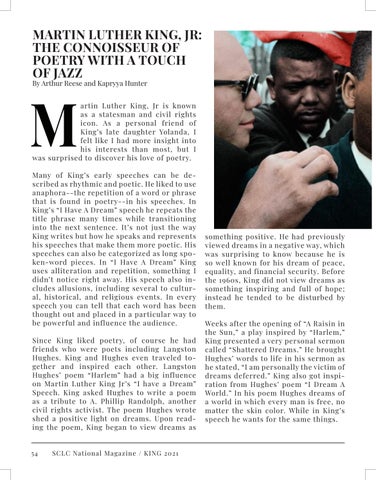MARTIN LUTHER KING, JR: THE CONNOISSEUR OF POETRY WITH A TOUCH OF JAZZ
By Arthur Reese and Kapryya Hunter
M
artin Luther King, Jr is known as a statesman and civil rights icon. As a personal friend of King’s late daughter Yolanda, I felt like I had more insight into his interests than most, but I was surprised to discover his love of poetry. Many of King’s early speeches can be described as rhythmic and poetic. He liked to use anaphora--the repetition of a word or phrase that is found in poetry--in his speeches. In King’s “I Have A Dream” speech he repeats the title phrase many times while transitioning into the next sentence. It’s not just the way King writes but how he speaks and represents his speeches that make them more poetic. His speeches can also be categorized as long spoken-word pieces. In “I Have A Dream” King uses alliteration and repetition, something I didn’t notice right away. His speech also includes allusions, including several to cultural, historical, and religious events. In every speech you can tell that each word has been thought out and placed in a particular way to be powerful and influence the audience. Since King liked poetry, of course he had friends who were poets including Langston Hughes. King and Hughes even traveled together and inspired each other. Langston Hughes’ poem “Harlem” had a big influence on Martin Luther King Jr’s “I have a Dream” Speech. King asked Hughes to write a poem as a tribute to A. Phillip Randolph, another civil rights activist. The poem Hughes wrote shed a positive light on dreams. Upon reading the poem, King began to view dreams as
54
S C LC National Magaz ine / KI NG 2 02 1
something positive. He had previously viewed dreams in a negative way, which was surprising to know because he is so well known for his dream of peace, equality, and financial security. Before the 1960s, King did not view dreams as something inspiring and full of hope; instead he tended to be disturbed by them. Weeks after the opening of “A Raisin in the Sun,” a play inspired by “Harlem,” King presented a very personal sermon called “Shattered Dreams.” He brought Hughes’ words to life in his sermon as he stated, “I am personally the victim of dreams deferred.” King also got inspiration from Hughes’ poem “I Dream A World.” In his poem Hughes dreams of a world in which every man is free, no matter the skin color. While in King’s speech he wants for the same things.











